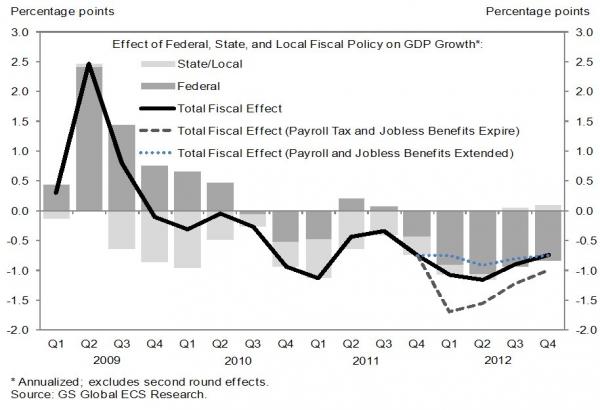I touched on this yesterday, but it’s important to put some figures with the broader facts. The supercommittee’s failure means there is now a substantially higher chance of the payroll tax and unemployment benefits expiring. As Goldman Sachs notes, this could have a material impact of -1% on GDP. In an environment of meager growth, this might just be enough to push us into official recession. More via Zero Hedge:
“Super committee failure means that (1) there is greater risk that the payroll tax cut expires, though there is still a chance this could be attached to a year-end spending bill; (2) spending cuts in 2013 will be more severe than they would have been under a super committee agreement; but (3) spending in 2012 will remain unchanged versus previous expectations.
…The payroll tax cut and emergency unemployment benefits expire at year end, unless Congress acts to extend them. The most obvious means for extension has been inclusion in the super committee package and failure to reach agreement has reduced the likelihood of extension of these provisions, for two reasons: (1) offsetting the cost of a payroll tax cut ($110bn/yr) and/or emergency unemployment benefits ($50bn/yr) extension is more difficult to do outside of the super committee process, where “creative accounting” such as the use of war savings would have been more easily tolerated by both parties, and (2) the political debate is likely to get more acrimonious following super committee failure, which could make it more difficult to agree on other items.”

Mr. Roche is the Founder and Chief Investment Officer of Discipline Funds.Discipline Funds is a low fee financial advisory firm with a focus on helping people be more disciplined with their finances.
He is also the author of Pragmatic Capitalism: What Every Investor Needs to Understand About Money and Finance, Understanding the Modern Monetary System and Understanding Modern Portfolio Construction.

Comments are closed.